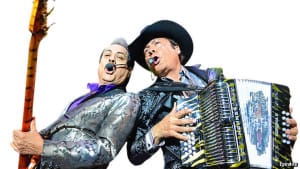
America´s Hispanics – Latino music: Listen to this
 A FEW YEARS ago a bit of social history was made when Drake, a rapper, boasted on a 2011 hit single: “Them Spanish girls love me like I’m Aventura”. The reference may have passed some fans by. Drake was referring to a Latino boy-band, “Aventura”, from the Bronx in New York. The group had enjoyed growing success among Spanish-speakers by infusing the sounds of R&B into bachata, a once obscure genre born in rural dance halls and dive bars of the Dominican Republic. Only a few years earlier many young Hispanics might have scowled at bachata. Puerto Ricans in the north-east had their own stars. Mexican-Americans followed “regional Mexican” styles like banda (lots of trumpets) or the accordion-driven polkas of norteño.
A FEW YEARS ago a bit of social history was made when Drake, a rapper, boasted on a 2011 hit single: “Them Spanish girls love me like I’m Aventura”. The reference may have passed some fans by. Drake was referring to a Latino boy-band, “Aventura”, from the Bronx in New York. The group had enjoyed growing success among Spanish-speakers by infusing the sounds of R&B into bachata, a once obscure genre born in rural dance halls and dive bars of the Dominican Republic. Only a few years earlier many young Hispanics might have scowled at bachata. Puerto Ricans in the north-east had their own stars. Mexican-Americans followed “regional Mexican” styles like banda (lots of trumpets) or the accordion-driven polkas of norteño.
Latin musicians who broke into the mainstream charts, such as Ricky Martin, sang in English, often in duets with Anglo “gatekeeper” stars. That still happens. But another, swaggeringly confident, bicultural market is taking shape. After going solo, Aventura’s lead singer, Romeo Santos, has sold out Madison Square Gardens in New York and filled arenas in such Mexican strongholds as Los Angeles—a once unthinkable feat for a bachata artist of Dominican-Puerto Rican stock. His single “Propuesta Indecente” is unknown to most Anglo-Americans, but has been viewed on YouTube more than 600m times.
Even traditional bands have seen their markets transformed by new migration flows to the Great Plains, Midwest and deep South. “Los Tigres del Norte” are giants of music, having sold 37m albums in a four-decade career. They sing of border crossings and smugglers, romantic betrayals and the heartache of exile.
Their band has played in every state except Montana. Each time the national media discover a new Hispanic community in Arkansas or South Carolina, the band has usually been there three years earlier, says Dwayne Ulloa, a long-time adviser to the group. Los Tigres “knew where their fans were before the census did”, he reckons.
On their tours they see a gulf between fans born in Mexico and their American-raised children. “A lot of the kids don’t think about the border. They don’t know how they came here,” frets Jorge Hernández, Los Tigres’s lead singer. Yet a changing country offers fresh themes for ballads, including a new song longing for America to elect a Hispanic president. Co-opting a racial slur used for Mexican border-crossers, the ballad concludes that this gallo del mojado (wetback rooster) “would sing very differently”.
DREAMers—first-generation migrants brought to the country illegally as children—have musical champions, too. The accordionist in “La Santa Cecilia”, a band from Los Angeles, benefited from Barack Obama’s temporary protection from deportation in 2012. The band used undocumented actors in the video to “El Hielo”, their biggest hit, about families divided by immigration raids. The band performs in English and Spanish, hopping between jazz, rural Mexican genres and Colombian cumbia. Their cover of the Beatles’ “Strawberry Fields Forever” blends Mexican harps and accordions with a Caribbean beat. An accompanying video turns the song into a homage to migrant strawberry-pickers in California. It is both hard to define and rather lovely.
